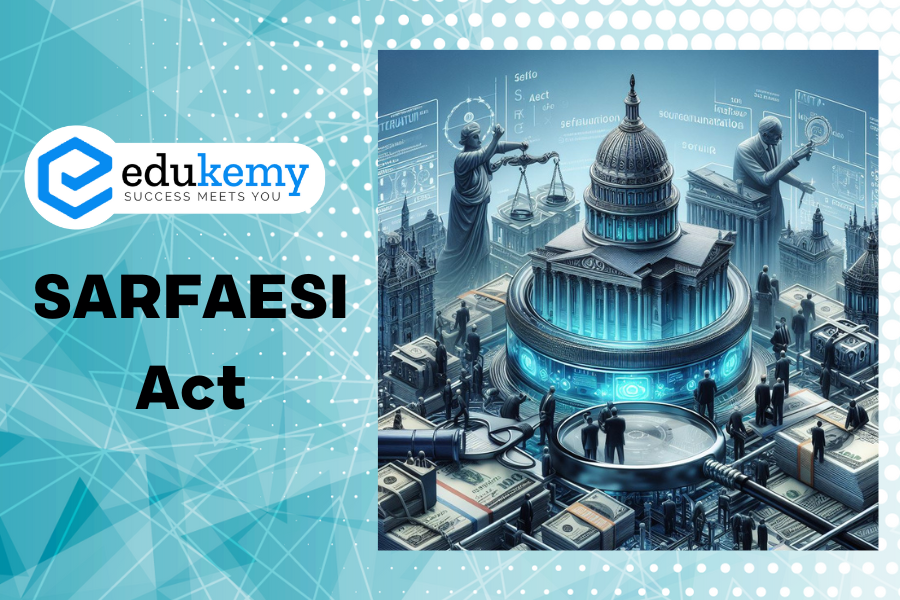
- The SARFAESI (Securitization and Reconstruction of Financial Assets and Enforcement of Securities Interest) Act, 2002, was designed to tackle the issue of NPAs (Non-Performing Assets) or bad assets.
- This legislation grants banks and other financial institutions the authority to recover loans by auctioning residential or commercial properties.
- Banks are enabled to confiscate collateral/securities (excluding agricultural property) without the participation of a court in case of a loan default.
Contents
- 1 Important Features
- 2 Important Points
- 3 FAQs
- 3.1 1. What is SARFAESI Act and who does it apply to?
- 3.2 2. What is the purpose of the SARFAESI Act?
- 3.3 3. What are the key provisions of the SARFAESI Act?
- 3.4 4. Can borrowers challenge actions taken under the SARFAESI Act?
- 3.5 5. Are there any limitations or safeguards for borrowers under the SARFAESI Act?
- 4 In case you still have your doubts, contact us on 9811333901.
Important Features
Through the SARFAESI Act, secured creditors (banks or financial institutions) possess significant rights for enforcement of security interest under section 13 of this Act.
If the borrower of financial assistance makes any default in repayment of a loan or any installment and his account is classified as Non-performing Asset by secured creditor, then secured creditor may require before expiry of period of limitation by written notice to the borrower for repayment of due in full within 60 days by clearly stating amount due and intention for enforcement.
The SARFAESI Act empowers financial institutions to ‘seize and desist’. They should give a notice to the defaulting borrower asking to repay the amount within 60 days. If the debtor doesn’t comply, the bank can resort to one of the three following measures:
- Take possession of the loan security.
- Sell or lease or assign the right over the security.
Manage the asset or appoint someone to manage the same.
- The Act also provides for the establishment of Asset Reconstruction Companies (ARCs) to acquire assets from banks and other financial institutions. ARCs are regulated by the RBI.
Important Points
The law does not apply to:
- Unsecured loans.
- Loans below ₹100,000.
- Where the remaining debt is below 20% of the original principal.
The SARFAESI Act provides for the establishment of Asset Reconstruction Companies (ARCs) which are to be regulated by RBI. Asset Reconstruction Companies can buy securities from banks and financial institutions.
The government has amended the SARFAESI Act in 2016 to empower the Asset Reconstruction Companies (ARC). ARC is a specialized and dedicated financial organization that purchases non-performing assets (NPAs) from financial institutions and banks in order to help them clean up their balance sheets.
The RBI registers ARCs, and the SARFAESI Act of 2002 regulates them.
FAQs
1. What is SARFAESI Act and who does it apply to?
- The Securitisation and Reconstruction of Financial Assets and Enforcement of Security Interest (SARFAESI) Act, 2002 is a legislation enacted in India to facilitate asset reconstruction and enforcement of security interests by banks and financial institutions.
- It primarily applies to banks, financial institutions, and asset reconstruction companies (ARCs).
2. What is the purpose of the SARFAESI Act?
- The SARFAESI Act provides banks and financial institutions with the power to enforce their security interests in the case of non-performing assets (NPAs) by seizing and selling the secured assets without the intervention of the court.
- Its aim is to expedite the recovery of bad loans and reduce the burden on the judicial system.
3. What are the key provisions of the SARFAESI Act?
- One of the key provisions allows banks and financial institutions to issue a notice to the borrower for repayment of dues, and if the borrower fails to comply, the institution can take possession of the secured assets.
- The Act also empowers banks to appoint a manager to manage the secured assets, and to sell or lease the assets to recover the outstanding loan amount.
4. Can borrowers challenge actions taken under the SARFAESI Act?
- Yes, borrowers have the right to challenge the actions taken by banks and financial institutions under the SARFAESI Act before the Debt Recovery Tribunal (DRT).
- Borrowers can file an appeal if they believe that the actions taken by the bank or financial institution are arbitrary or not in accordance with the provisions of the Act.
5. Are there any limitations or safeguards for borrowers under the SARFAESI Act?
- While the SARFAESI Act empowers banks and financial institutions to enforce their security interests, it also provides certain safeguards for borrowers.
- Banks are required to issue a notice to the borrower before taking any action, allowing them an opportunity to repay the dues and prevent enforcement of security interests.
- Additionally, borrowers can appeal to the DRT if they believe that the actions taken by the bank are not in compliance with the provisions of the Act.
In case you still have your doubts, contact us on 9811333901.
For UPSC Prelims Resources, Click here
For Daily Updates and Study Material:
Join our Telegram Channel – Edukemy for IAS
- 1. Learn through Videos – here
- 2. Be Exam Ready by Practicing Daily MCQs – here
- 3. Daily Newsletter – Get all your Current Affairs Covered – here
- 4. Mains Answer Writing Practice – here

